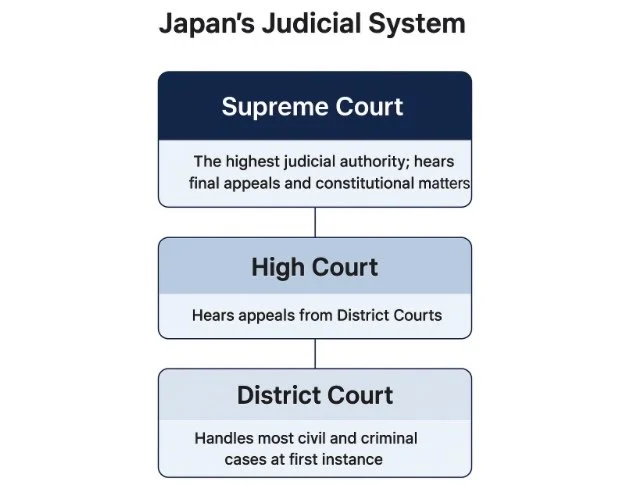Legal Help in Japan: What Expats Should Know About Attorneys
When living abroad, the last thing you want is to get into trouble that requires legal support. Still, situations may arise where legal advice is necessary — from rental disputes and neighborhood issues to employment problems or inheritance matters.
That said, Japan’s legal culture is very different from what many foreigners are used to. Litigation is relatively rare.
According to a study cited in Sociology of Law (2nd Edition) by Shini Murayama and Ryo Hamano, Japan sees 651 lawsuits per 100,000 people, compared to 3,095 in the U.S.—roughly 4.7 times more per capita.
This post is not legal advice, but a practical guide based on my experience as a former HR head who has worked with attorneys in both Japan and the U.S. I’ll share what I’ve learned — from how to find the right type of attorney to how to communicate effectively, avoid cultural pitfalls, and manage your expectations.
I won’t go into courtroom procedures or how prosecutors work. Instead, this is about how to work with attorneys when you need legal support in Japan.
In this blog:
1. Compared with US, why litigation is less in Japan
2. How the Legal System Works
3. Common Situations Where You Might Need an Attorney
4. Types of Legal Professionals in Japan
5. How to Find and Choose an Attorney
6. What to Expect Working with an Attorney
7. Wrap up
1.Compared with US, why litigation is less in Japan.
Legal fees and time commitment: Unlike companies that are accustomed to legal disputes, ordinary individuals face significant burdens when it comes to lawsuits—high legal costs, time-consuming evidence gathering, long court proceedings, and emotional stress.
In the U.S., taking legal action is widely accepted as a citizen’s right, and the legal system is structured to support that.
In contrast, in Japan, litigation is often viewed as a last resort.
Discovery system: Its broad and powerful discovery system in the US, which allows both parties to access evidence from each other before trial. This makes it easier to build a case, even when key information is held by the other side.
In Japan, evidence collection procedures exist but are limited in scope and weak in enforcement. In practice, especially in business disputes, labor cases, or medical malpractice, critical evidence often remains with the opposing party. As a result, individuals are sometimes forced to give up on pursuing legal action.
🔹 Personal Reflection
In the U.S., I was impressed by how naturally an employee pursued legal action after a personal tragedy, seeking accountability in a process that felt seamless and socially accepted. With many Americans familiar with jury duty, litigation is embedded in everyday life.
In Japan, I’ve observed disputes like inheritance, divorce, and employment issues often handled privately, as the high costs, time commitment, and uncertainty of litigation—sometimes compounded by a social stigma against lawsuits—discourage individuals from pursuing legal action, making it a last resort.
2. How the Legal System Works
• Structure of Japan's Court System (Three Layers)
Japan’s judicial system has three main levels.
There are also:
Summary Courts (簡易裁判所) for small claims
Family Courts (家庭裁判所) for domestic matters
• Jury System in Japan vs. U.S.
The jury system is one of the most visible differences:
a. United States:
Jurors are commonly used in both criminal and civil trials. Legal arguments are presented to a jury of peers, which decides on facts and often the verdict.
b. Japan:
Japan does not have a civil jury system. Instead, for serious criminal cases, Japan introduced a limited form of lay participation called the “裁判員制度” (Saiban-in System) in 2009.
In this system, 6 lay judges and 3 professional judges jointly deliberate and decide a verdict. It does not apply to civil or labor cases.
✅ Tip: Under the Labor Standards Act, employees selected to serve as lay judges are legally entitled to take time off for jury duty. However, whether this leave is paid or unpaid depends on the company’s internal policies.
Importantly, the law also prohibits employers from dismissing or treating an employee unfavorably because of their selection as a lay judge.
• Alternative Dispute Resolution in Japan
Japan strongly encourages resolving disputes outside of court. Here are key terms to understand:
a. Mediation(調停): A neutral third party facilitates a compromise between the parties, usually within a court-supervised framework. Common in family, neighborhood, or small business disputes.
b. Arbitration(仲裁): A private, legally binding decision is made by an arbitrator chosen by the parties. Often used in commercial disputes.
c. Labor Tribunal System(労働審判制度): A special procedure for resolving employment disputes quickly and fairly within the court system.
• Labor Tribunal: 3-Step Flow
a. Application (申立て):
Employee files a case with the District Court under the Labor Tribunal procedure.
b. Hearing (審理):
A panel (1 judge + 2 labor experts) hears both sides, often completing proceedings in 2–3 sessions.
c. Decision or Settlement (審判/和解):
The panel proposes a solution. If either party disagrees, they can escalate to a full civil trial.
🔹Case Example: Labor Tribunal in Action
I inherited a case from my HR predecessor and attended a labor tribunal in Japan involving a claim of unfair dismissal. To be honest, I expected it to be difficult, as unfair dismissal is extremely hard to prove in Japan—especially when performance is the main issue. In the U.S., the same employee likely would have been terminated without much dispute.
Still, the experience gave me valuable insight into how Japan’s labor tribunal system actually works: how evidence is presented, how attorneys on both sides frame their arguments, and how the tribunal facilitates resolution through structured, time-bound sessions.
In the end, the tribunal ruled in favor of the employee and ordered a settlement from the company—though reinstatement was not granted.
I also recall a foreign employee once saying confidently, “Companies in Japan can’t terminate me,” when we recommended resignation. While not entirely accurate, that belief is common. Dismissal is difficult—but with proper procedures, including recommending resignation, it is possible.
Disclaimer:
This story is based on a personal experience and is shared for informational purposes only. It does not constitute legal advice. Specific outcomes may vary depending on the facts and circumstances of each case. If you are facing a legal issue, please consult with a qualified attorney in Japan.
3. Common Situations Where You Might Need an Attorney
There are many situations—both personal and professional—where legal advice in Japan can be helpful, or even essential. Here are some examples of when you might consider speaking with an attorney:
• Personal Use Cases
Rental issues: Termination, renewal, deposit disputes, restoration costs, neighborhood problems
Divorce and separation: Alimony, infidelity, child custody, visitation rights
Inheritance & family law: Wills, estate division, guardianship, inheritance and gift tax
Debt & money issues: Bankruptcy, loan disputes, fraud
Immigration: Visa renewals, overstays, appeals for visa denial or revocation
Consumer rights: Faulty products, refund refusals, spiritual fraud (霊感商法 – exploitative sales using spiritual claims)
Traffic accidents: Compensation, insurance claims, accidents involving elderly drivers
Defamation & harassment: Online abuse, school bullying, social media slander
Abuse cases: Sexual abuse, child abuse, elder abuse, abuse of persons with disabilities
Medical issues: Malpractice claims, hospital errors, disputes over consent or care decisions
Neighbor disputes: Noise complaints, property boundaries, trash and odor issues
Criminal defense: If arrested or accused, particularly for foreigners unfamiliar with the Japanese system
• Business Use Cases
Employment law: Dismissals, terminations, hiring contracts, wages, severance, harassment, leave policies, workplace injuries
Internal investigations: Harassment, whistleblower reports, misconduct
Compliance and regulatory matters: Data privacy, corporate reporting, health/safety
Contract disputes: Issues with vendors, clients, business partners
Intellectual property: Trademark disputes, copyright infringement, patent licensing
Business formation & closure: Legal setup, dissolution, shareholder disputes
Immigration/employment visas: For hiring foreign workers or dealing with regulatory audits
4.Types of Legal Professionals in Japan
Here is a list of legal and para-legal professionals in Japan. Depending on your situation, you may not need to consult an attorney for everything—some specialists handle administrative or procedural matters.
For instance, In the U.S., it’s common to hire an attorney when buying property to conduct a title search. In Japan, this role is usually handled by a judicial scrivener (司法書士), which simplifies the process.
However, only a licensed attorney (弁護士, bengoshi) can represent you in court in most legal proceedings. Many foreigners mistake gyoseishoshi for “attorneys,” but they cannot represent clients in litigation.
5. How to Find and Choose an Attorney
If you’re simply seeking legal advice, you may not need a top-tier attorney. But if you require court representation or negotiations—especially those aimed at reaching a settlement before trial—choosing the right attorney becomes critical. Here’s some guidance to help you find the right fit:
What to Look For
a. Experience with real case closures
Japan does not have a public database showing an attorney’s case history or success rate. It’s often helpful to speak with multiple attorneys and see who feels most competent and trustworthy. Always confirm fees in advance.
b. Referrals are ideal
Recommendations carry weight. Someone familiar with an attorney’s background or success record can help you avoid a poor match. Ask your network—friends, community groups, or even your local municipal office.
c. English-speaking attorneys can be helpful—but don’t limit yourself
If a friend or colleague can help interpret, you may be able to work with a strong attorney who doesn’t speak English, which can significantly broaden your options.
d. Hou Terasu (法テラス)
A public service offering free information about Japan’s legal system, bar associations, and available support in English and nine other languages. It’s an excellent starting point for expats.
e. My Recommendation
One firm I’ve had a good experience with is Kitahama Partners—a well-established firm with a broad practice. Some attorneys speak English, and I found them professional and approachable.
In recent years, alternative dispute resolution (ADR) methods such as arbitration and mediation have become more common in Japan. Kitahama also handles these.
✅ Tip:
When it comes to employment issues, keep in mind that some attorneys represent companies while others focus on employees. Large firms tend to represent employers, so if you’re an employee, it’s important to find an attorney who advocates for individuals.
Large firms may assign a junior attorney initially, who can consult with senior attorneys as needed. However, juniors are still very sharp. Smaller firms may assign a senior attorney from the beginning.
⚠️ Be Careful
Not all expensive attorneys are effective. This is often the hard part.
If you're looking for a strong, battle-tested attorney, I personally recommend choosing someone based in Tokyo or Osaka, where attorneys are more likely to handle high-stakes cases on a regular basis.
🚩 Red Flags to Watch For
a. Lack of knowledge or relevant experience – This can seriously undermine your case.
b. Poor communication or vague explanations – You should understand what’s happening and why.
c. Doesn’t listen to your concerns – A good attorney takes your input seriously.
d. Arrogant or dismissive attitude – Respect matter.
e. Excessive or unclear fees – Always ask for a fee structure in writing.
f. Slow to respond or hard to reach – Timely communication is essential.
g. Disorganized or poor time management – Missed deadlines can hurt your case.
h. Rude staff or unprofessional office support – A disorganized front desk often reflects deeper problems.
It can be hard to assess these traits in advance, which is why referrals are so helpful. When it comes to disputes or litigation, my personal policy is to invest in an excellent attorney. In the long run, it’s worth it.
🔹Real Story
One major law firm in Tokyo billed over JPY 1 million after months of back-and-forth without any results. The lead attorney charged JPY 70,000 per hour, and several junior attorneys joined the calls—each adding to the cost.
This case showed that hiring a big-name firm doesn’t guarantee you’ll get a result. It really depends on the individual.
In contrast, a sharp and experienced attorney with a proven track record quickly resolved a heated dispute through skilled negotiation.
She even told the opposing party’s young attorneys:
“It’s also your responsibility as an attorney to help your client understand what’s socially acceptable and within a reasonable range (社会通念と相場), and guide them toward a settlement.”
Sure enough, she closed the case—and we didn’t have to go to a labor tribunal or court.
Her hourly rate was JPY35,000 per hour.
✅ Tip: Managing Legal Costs
a. Retainer/Initial Fee Structure (着手金):
Many Japanese attorneys charge an upfront fee called chakushokin (retainer). After that, you’ll typically pay by the hour.
The amount of this initial fee varies depending on the type and complexity of the case. For example:
—Divorce litigation: typically ¥200,000 or more
—Inheritance division or claims: ¥300,000 or more
—Traffic accident settlement negotiations: ¥100,000 or more
These are general benchmarks and may vary by firm and region.
b. Attorney Consultation Fees:
The typical rate for one-hour consultation is around JPY 10,000 to 25,000, though more law firms are now offering free initial consultations (Typically 30 minutes).
c. Contingency Fees (成功報酬型):
In certain types of cases—such as personal injury, unpaid wages, or some labor disputes—it’s possible to hire a attorney on a contingency basis.
This means you pay little or no upfront fee, and the attorney takes a percentage of any compensation you receive if the case is successful.
Contingency fees are usually 10–20% in Japan and are not as common or generous as in countries like the U.S. (where 30–40% is typical).
They’re rare for complex civil, business, or immigration cases. Always ask directly whether this option is available.
d. Travel fees and actual expenses:
In addition to the above, there may be incidental costs such as appearance fees for court attendance or travel-related expenses. Be sure to confirm these in advance.
e. Some people may assume that the losing party pays the attorney’s fees, but in civil cases in Japan, each party is generally responsible for paying their own attorney—regardless of the outcome.
f. Monthly Invoices:
Firms usually send a monthly invoice detailing:
What topics were discussed
Time and date spent
Which attorney handled it and their hourly rate
Keep Your Own Records:
Record or log every conversation with your attorney. This can serve as a reference if a billing issue arises.
Review and Challenge if Needed:
Don’t hesitate to ask questions or challenge the cost if the billing doesn’t align with your expectations or records.
6. What to Expect Working with an Attorney
Preparation is key !!
You’ll need to prepare a clear timeline of events related to your case and gather any supporting documents or evidence.
If there’s a language barrier, written communication is especially helpful to ensure mutual understanding.
Be honest and transparent.
It may feel uncomfortable to admit your own mistakes—such as something you said or did—but your attorney needs to know the full picture to represent you effectively.
I’ve personally had to share comments I regretted making as an HR professional. It wasn’t easy, but it was necessary.
Expect a cautious, strategic, and paperwork-heavy process.
Japanese legal culture is conservative. Attorneys are unlikely to say, “You’ll definitely win.”
They analyze risk carefully and communicate in legal terms. Don’t expect quick or overly optimistic answers.
Not all attorneys will take your case.
Some attorneys are selective about the cases they accept. Be sure to clarify early on whether they are willing and available to represent you.
⚠️ Common Attorney Pet Peeves in Japan
Avoiding these will help you build a productive relationship:
Providing a disorganized or confusing explanation of your case
Walking in without an appointment
Being overly emotional or confrontational
Demanding free advice or services
Distrusting their expertise or acting condescending
7. Wrap up
Based on my experience in HR, I’ve seen many different kinds of disputes. This is just my personal reflection, but once a conflict becomes emotional—even on one side—direct negotiation usually becomes impossible.
While hiring an attorney can be expensive, there’s real value in having a calm, professional third party handle negotiations on your behalf. It can save time, energy, and stress. Simply involving an attorney can also create a degree of psychological pressure on the other party, which sometimes helps move things toward resolution.
I hope you’re able to find the right support when needed—and that your life in Japan remains as stress-free as possible!!







